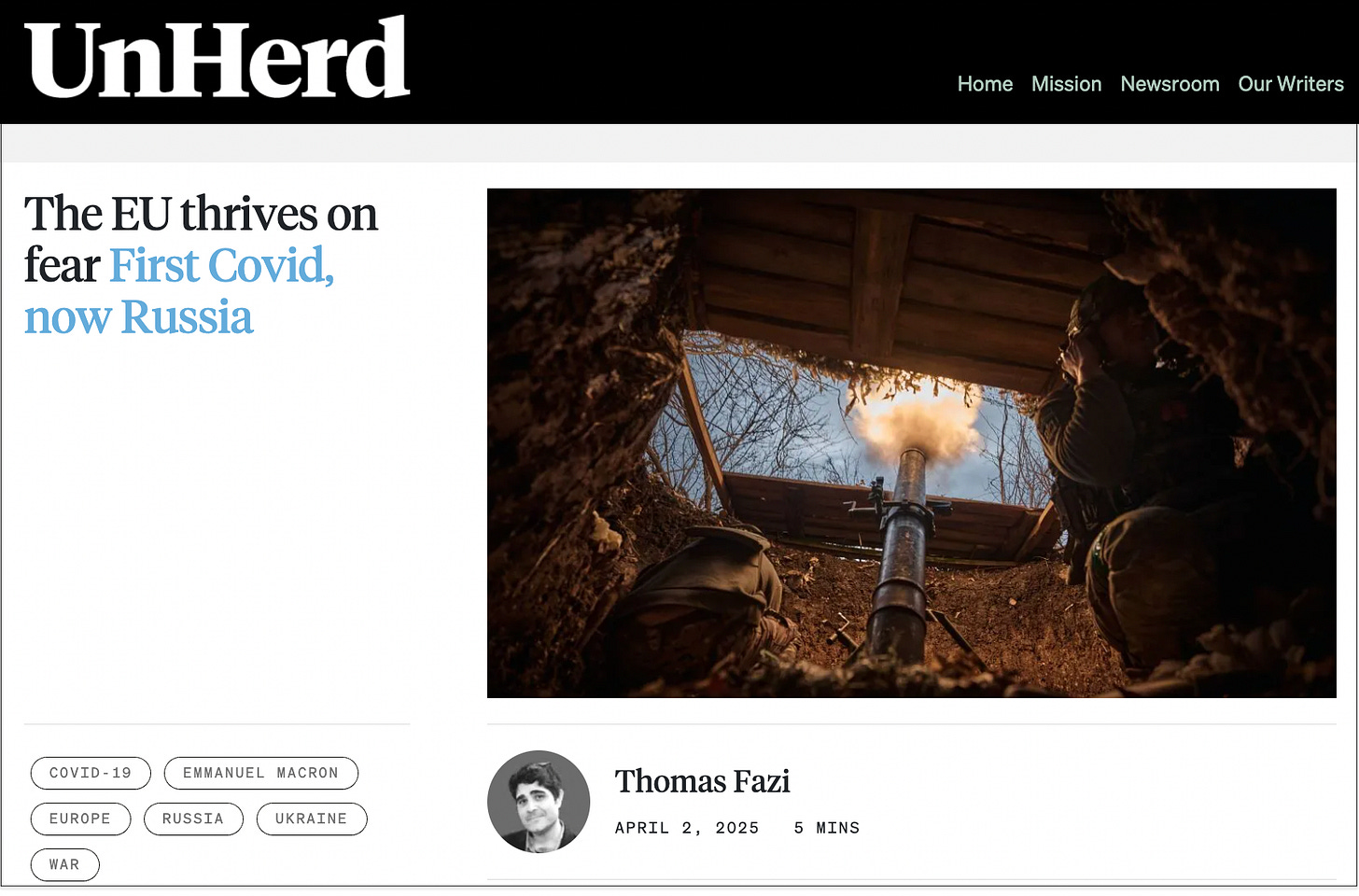From Covid to Russia: the permanent politics of fear
The inflation of the Russian threat is a continuation of the Covid-era paradigm: a method of governance that fuses psychological manipulation, militarisation and the normalisation of emergency rule
I’ve written for UnHerd about the EU’s ludicrous “72-hour emergency pack to survive nuclear war” and how it represents a continuation of the Covid-era paradigm: a method of governance that fuses psychological manipulation, militarisation of civilian life and the normalisation of emergency rule:
When considered alongside the EU’s rearmament plans, it becomes clear that Brussels is pursuing a comprehensive, society-wide militarisation. In the years ahead, this militarised approach is set to become the dominant paradigm in Europe, as all spheres of life — political, economic, social, cultural and scientific — will be subordinated to the alleged goal of national, or rather supranational, security. This centralisation is proceeding under the guise of protecting citizens, but in practice, it will lead to further censorship, surveillance and the erosion of civil liberties — all justified by the ever-present spectre of Russian interference.
Sound familiar? It should. Western governments have been resorting to fear as a means of control for a very long time. Indeed, it’s a telling coincidence that the EU’s announcement coincides with the fifth anniversary of the Covid lockdowns, which ushered in the most radical experiment ever attempted in fear-driven politics — a new method of government defined by permanent emergency, psychological warfare and the suspension of democratic norms.
The pandemic response used a totalising narrative that wildly inflated the threat of the virus — framed as an invisible killer that could strike anyone and anywhere — to justify historically unprecedented policies. As the Director-General of the WHO, Tedros Adhanom Ghebreyesus, put it, it was everyone’s moral duty to “come together against a common enemy” and “wage war on the virus”. In this struggle for the greater good — public health — virtually any action was justified.
From the perspective of “crisis politics”, the widespread use of the war metaphor to frame the Covid pandemic was no coincidence: war is, after all, the emergency par excellence. One of the (wholly intended) consequences of this was the militarisation of the public debate: the framing of any dissenting opinion in terms of desertion, treason or worse, and the characterisation of any critical voice as an “enemy within” hindering the “war” efforts. This single narrative was hammered out on a daily basis by resorting to a “full-spectrum control” of the information flow.
This single narrative was employed to justify an increasingly authoritarian turn in global politics, as governments across the planet used the “public health emergency” to sweep aside democratic procedures and constitutional constraints, militarise societies, crack down on civil liberties and implement unprecedented measures of social control.
Throughout the pandemic, we witnessed — and populations largely accepted — the imposition of measures that would have been unthinkable up until that moment: the shutdown of entire economies, the mass quarantining (and subsequently the enforced vaccination) of millions of healthy individuals and the normalisation of digital Covid passports as a regulated requirement for participating in social life, resulting in the exclusion from public life and subsequent demonisation and criminalisation of the unvaccinated, the new public enemy number one.
All this laid the basis for the collective reaction of Western societies to Russia’s invasion of Ukraine — a real war at last, after years of rehearsing through metaphorical ones. In terms of communication, we immediately saw the emergence of a similarly totalising narrative: in the light of Russia’s totally unprovoked and unjustified invasion of Ukraine — ignoring NATO’s decades-long “barking at Russia’s doors”, as Pope Francis put it — it was Western societies’ moral duty to support the Ukrainians’ unblemished fight for freedom and democracy against Russia and its evil president. Once again, dissenters were labelled traitors or stooges and factually accurate yet inconvenient statements were dismissed as “disinformation”.
However, as it becomes increasingly apparent that Ukraine is losing the war and faced with Trump’s attempt to negotiate peace, European elites are recalibrating their narrative: it’s not just Ukraine’s survival at stake — but that of Europe as a whole. The threat is no longer over there but right here at home.
Read the article here. If you’re a paid subscriber and you can’t access the paywall write to me at thomasfazi82@gmail.com.
Putting out high-quality journalism requires constant research, most of which goes unpaid, so if you appreciate my writing please consider upgrading to a paid subscription if you haven’t already. Aside from a fuzzy feeling inside of you, you’ll get access to exclusive articles and commentary.
Thomas Fazi
Website: thomasfazi.net
Twitter: @battleforeurope
Latest book: The Covid Consensus: The Global Assault on Democracy and the Poor—A Critique from the Left (co-authored with Toby Green)




Is it not strange that these Governments resort to keeping people in fear rather than having a happy populace. A 'happy' populace is more likely to work well for it's country than an unhappy one.
I saw this in Company's that I worked in. Decent holidays/healthcare/maternity leave is always going to be a company which is more productive.
I think this Editorial is spot on.
I've long believed that the EU, along with the liberal elites, is engaged in a hypocritical scheme that is driving Western democracies toward collapse. To maintain control and avoid accountability, they continuously shift from one psychological manipulation to another, disguising their failures as strategic moves.